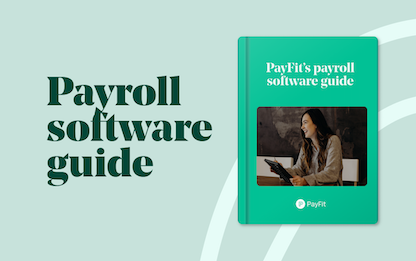- Blog
- |Managing Payroll
- >Payroll data
- >tracking payroll data
Why Tracking Payroll Data is Important

Is accessing payroll data really a game-changer? The short answer is yes. Payroll data is much more than how many people you’ve paid and what you’ve paid them (although this is important, too). It’s about accessing useable data to help steer your business in the right direction.
Tracking data generally allows you to make informed decisions because these decisions are based on reliable information. As we know, data is knowledge, and knowledge is — you guessed it, power. So to grow your business and remain competitive in your market, you should start tracking this data sooner rather than later.
From minimising errors to helping drive valuable business strategy, let’s explore the power payroll data can hold for your organisation.
Inform future business decisions
Data presents hard facts to business teams, which is useful when determining which direction your business should take. There’s no use in guessing or even making educated guesses. To make important decisions, you need to be certain that the data is right and your data will always be accurate with a payroll software solution.
Payroll data helps you better understand your business, and who doesn’t want access to that kind of information?
Keep tabs on the expenses your business is shelling out — is there a disparity between office locations? Are profits falling as wages increase? Should you be outsourcing work to contractors to save money and drive efficiency? This is the kind of landscape you can become instantly familiar with when analysing payroll data.
Payroll data helps retain employees
You’ve worked so hard to find and secure top-tier talent, so it’d be a waste of everyone’s time if you didn’t try your best to retain them — not to mention a waste of money. Recruiting new employees can cost a company £3,000 on average!
But how does payroll data help you retain these people? Payroll data can help you analyse employee performance and scrutinise employee turnover. You can spot patterns in employee turnover, helping you further understand which departments are struggling to retain staff and why.
You can implement a cyclical feedback process to help you improve communication with your employees (you can do this with our 1-2-1 feature). Find out what’s making them happy, pinpoint why they’re unhappy, figure out how the organisation can best support them in their job going forward and analyse trends in their answers over time.
According to data, 86% of employees don’t feel heard in their organisation — that’s why opening a clear communication channel between employees and managers is so important for retaining staff. In addition, communication channels can ensure managers and team leaders are equipped and informed about how employees feel, allowing them to improve employee experience and retention rates.
Discover pay inequalities
The gender pay gap is a hot topic, quite rightly so. Non-equal pay should be something you actively try and eradicate because there’s no reason for it to exist, but only 19% of employers say they are aware of a gender pay gap in their organisation. The gender pay gap is important to 87% of women and 70% of men. So if it’s on your 2022 radar, you can use your payroll data to identify salary discrepancies quickly.
Manually identifying these gaps can be time-consuming, but with automated payroll software, it’s a doddle. However, after a quick glance, you can see exactly where the inequalities lie and start addressing them almost immediately.
Gaining access to reliable salary data means you can consistently benchmark salaries going forward, so you know you’re paying everyone a value their job role is worth, which will help you attract candidates going forward.
Data visualisation makes everything easier to understand
Let’s say you’re currently working from excel spreadsheets and have to create your own graphs and visualisations to get a clear picture of your company costs. In that case, you might need to consider alternative solutions.
Humans process visuals 60,000 times faster than text, so with the help of a payroll management system, you can view data visualisations whenever you want — the beauty of real-time data. For example, you can quickly filter data to see who’s on annual leave or taking sick leave and analyse company costs with gross income, employee NIC contributions and more.
Using software like this to view this data in graph-form means that you’re also cutting out a few manual steps taken to create your excel spreadsheets in the first place.
You can do it. Loosen your grip on the spreadsheets and embrace an easier way to report.
Tracking payroll data minimises errors
Payroll errors can be a drag. They can take your payroll team ages to rectify when they crop up, reducing time spent on other tasks. But you can minimise these time-consuming errors by tracking your data through payroll software.
Using software in the first place removes a lot of human intervention, which leaves you exposed to fewer human errors. Unfortunately, errors don’t just cost time — they can erode the trust between the company and its employees, too.
Spotting errors quickly using payroll software means you can pinpoint recurring errors and investigate to remove them from your monthly payroll altogether. For example, frequent errors might indicate you need a group session to refresh employee knowledge on a particular aspect of payroll, i.e. expense management.
You might even find the cause of errors is staff burnout — so tracking payroll data to find these errors in the first place can help you better understand business processes and how to improve them going forward.
Hopefully, you’re pumped up and ready to analyse your payroll data after reading this. If you’re looking for automated payroll software to help you accurately track your payroll data, we could be a good fit. Book a demo to learn more about PayFit and how we can help you.


The 2024 UK National Living Wage - An Employer’s Guide

The Cost Of Recruitment In The UK - What You Might Not Know

UK National Insurance Changes for January 2024

End Of Tax Year 2023/2024 - Eight Key Changes For 24/25

Strategies to Reduce Employee Turnover

